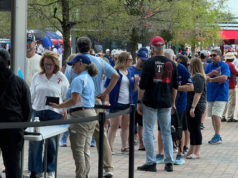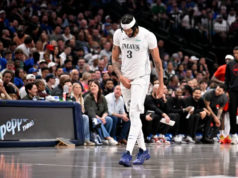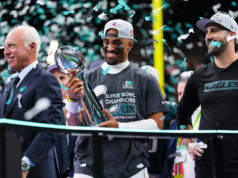This year wasn’t historically awful, but it was close.
The last college team to appear in a National Championship and then ride their couches during bowl season was the 2010 Longhorns after losing to Alabama in the BCS National Championship game. The Horned Frogs are the first team in the playoff era to mediocre their way out of any bowl after riding last season’s rollercoaster to their Georgia beatdown and corresponding national disgrace.
TCU softly flushed this season after surrendering 69 points to Oklahoma in Norman. Fans, pundits, and yours truly were eagerly expecting a press release the next day announcing that either offensive coordinator Kendal Briles or defensive coordinator Joe Gillespie had been dismissed. Instead, it took nearly two-and-a-half weeks to disclose that Gillespie’s 3-3-5 experiment had concluded. The results: It was neither good at stopping the run nor the pass, and when factoring for TCU’s comically low time of possession, the side effects were many lost games and even more heartbroken supporters.
By the numbers, out of 133 Division I teams, the Frogs finished 80th in scoring defense, 10 spots better than last year’s 90th but without the three additional games against ranked teams factoring into the equation. In total defense, this year’s squad was 103rd in yards allowed, worse than last year’s 95th, even without the conference championship and two playoff matchups. It doesn’t take a statistics professor or an invested football fanatic to recognize how poor(ous) the defense was both years. This season’s addition of Briles, who ran plays at an even faster rate — and less effectively — than predecessor Garrett Riley, amplified the deficiencies of a group who had been just squeaking by.
Athletic Director Jeremiah Donati wasted no time in hiring Gillespie’s replacement on Monday. Recently dismissed Boise State head coach Andy Avalos will lead TCU’s defenders next season. A decorated linebacker on the blue turf, Avalos was the DC at Oregon for two seasons before becoming head of his alma mater for the last three. For comparison, Avalos’ defenses have ranked in the Top 15 in scoring prevention three times in the last five seasons, so it’s safe to assume the transition at least has the foundation as an upgrade.
If you’re still craving college football in 2023, even if it’s out of spite, there are a few bowls you should check out before the playoffs commence. The first matchup involving a Texas team is Saturday in Shreveport when Tech takes on Cal. The Red Raiders and Head Coach Joey McGuire need a boost after backing into a bowl — thanks mostly to their victory over TCU — after they were picked by some to be a contender for the conference crown. How they perform against the lackluster Golden Bears could have a direct impact on whether next season is make or break for McGuire.
Across a somewhat barren slate is A&M against Oklahoma State in the Texas Bowl two days after Christmas. The most recognition the Ags have received recently is how much they’re willing to pay someone not to coach, but both the Aggies and the Cowboys represent a fascinating local-ish battle of former Southwest Conference and Big 12 enemies, both little brothers to more prestigious programs in their own state — though, to be fair, Oklahoma A&M (which is what they used to be called) actually wins sometimes. The Aggies won’t have their new coach, former Blue Devil (and Aggie DC) Mike Elko, but an interim status will make for exciting albeit disjointed football against the Pokes, who started off in a tailspin, rose to a possible championship appearance, and then fell flat when they had a chance to ruin UT’s season.
The Valero Alamo Bowl airing the next day is not necessarily an interesting matchup, but Arizona versus Oklahoma represents incoming versus outgoing Big 12. It will provide hungry conference supporters an opportunity to feast their eyes on our new West-annex cohort and bid good riddance to the Sooners forever.
The only other noteworthy game before 2024 is the Orange Bowl between Georgia and Florida State, two teams with a legitimate gripe that they were left out of the playoffs. This is an experiment in motivation, since neither team should have any — outside of convincing the playoff selection committee they’re idiots. Expect the Dawgs to roll. They’re the better team on paper and in reality, while FSU is simply an excellent defense trying to cover for an offense that will be even less capable than it was in November.
Transparently, this year’s bowl slate sucks, but the playoffs are excellent. The afternoon Rose Bowl between Michigan and Alabama is a test of proven commodities. Michigan is the winningest college program ever, and the Crimson Tide have the most championships of any program currently competing in DI. The Wolverines, despite in-season controversy, are back-to-back conference champions and haven’t lost since this time last year against TCU, when everything that could have gone wrong for them did. Only Maryland and Ohio State finished within a possession of the Michiganders this season, and the Wolverine defense completely smothered eight of their opponents, allowing only 7 or fewer points each time while scoring consistently on offense with a run-first strategy.
Alabama, after starting their season with an L hosting the Longhorns, have been equally effective on both offense and defense and have managed their SEC schedule nicely without looking as dominant as days past but still beating most opponents comfortably. Michigan’s defense is the best unit on the field and line up well with the Tide’s big-play potential. Neither team is likely to eclipse 28 points in the contest, but expect the Wolverine defenders to emerge as the difference in a one-score contest that leaves all SEC teams watching the National Championship game from home for only the second time since the playoff was created in 2014.
The evening Sugar Bowl between Texas and Washington is more intriguing because each team is less proven, despite the Huskies boasting an unbeaten record and the Longhorns winning in Tuscaloosa. Washington rosters the best quarterback in the playoffs, which is an important consideration, but UW claimed seven victories this season by one possession or fewer, routinely needing late-game heroics to eclipse good — but not great — opponents. The Huskies beat the Oregon Ducks, who I believe were largely overrated, twice and by only 3 each time.
Texas has been no more reliable but more dominant regularly. They own a more signature win along with a clearly better defense. Quinn Ewers, despite his youth-group-leader makeover this season, is still less consistent than Michael Penix Jr. but still possesses great-game potential. The Huskies’ receiving corps is better top to bottom, but Xavier Worthy of Texas might be the most explosive player in college football, as long as he’s had enough time to recover from an ankle injury suffered in the conference championship game. This game will be more fun to watch because neither team is as good as Michigan or Alabama, but I believe Texas’ defense will be the most significant phase and allow the Longhorns to claim a 34-28 victory, even if they fall cold for a quarter or more, which they have several times this season.
If all goes according to my crystal ball — which I purchased at Scarborough Faire several years ago, thanks for asking — fans will be rewarded on January 8 with a rematch of the 2005 Rose Bowl. In the only previous meeting between the Wolverines and Longhorns, UT knocked in a walk-off field goal for a 1-point victory. If the two do meet for the second time, I believe Big Blue will grasp redemption along with their first National Championship trophy since 1997.












